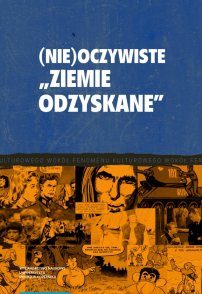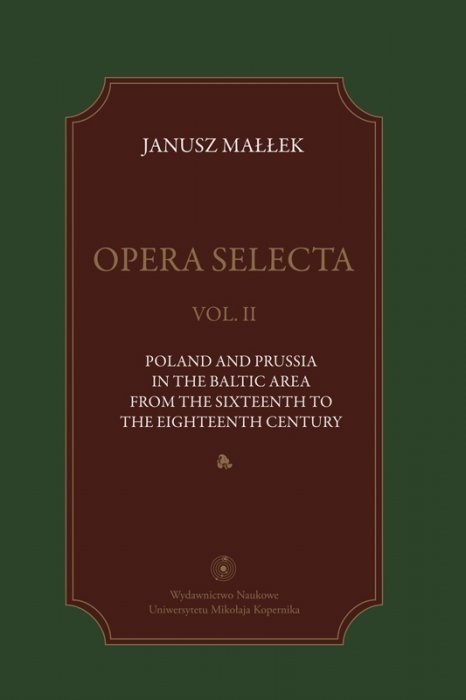Opera Selecta, t. II: Poland, Prussia in the Baltic area from the sixteenth to the eighteenth century
The historical milieu in Toruń, built from scratch after the Second World War by people working at the universities in Vilnius and Lvov before 1939, has always boasted eminent personages. One of these is Janusz Małłek, who, under the influence of his family, especially his father, Karol, an eminent activist and columnist from Masuria, and also of his history teacher from the pedagogical secondary school in Mrągowo, abandoned the idea of earning a living through literary activity and focused on developing his interest in history. Embarking on a degree in history at Nicolaus Copernicus University in 1955 determined the life and career of the future professor and the connection then established with the university in Toruń has lasted for over half a century.
The significance of Professor Janusz Małłek’s contribution to the consolidation of the academic standing of Toruń’s historical milieu should be recognised. His publications, in which he focused, especially in the early stages of his research, on the history of Ducal and Royal Prussia in the sixteenth and seventeenth centuries and the history of the Reformation in Poland and Europe, were received with great interest not only by Polish historians but also provoked lively discussions and polemics among specialists in other European countries. When he broadened the scope of his research to cover matters connected with the history of Scandinavia and Germany, he became one of the most recognisable Polish historians abroad. The variety of the lines of research, which increased considerably with the passage of time, resulted in Professor Janusz Małłek publishing over 350 papers. They all display profound knowledge and erudition, as well as the outstanding skills to which the Professor always attached great importance and which should be a role model for other researchers. The high academic position of the Professor is testified by his membership of numerous academic societies and organisations, including Verein für Reformationgeschichte, Historische Kommission für Ost- und West12 preussiche Landesforschung, and the Polish Academy of Arts and Sciences (Polska Akademia Umiejętności). Not many outstanding academics possess the ability to combine academic work with administrative work. Professor Janusz Małłek’s organisational achievements are considerable. Suffice it to mention his duties as head of the Department of Modern History and History of Scandinavian Countries, deputy director of the Institute of History and Archive Studies, the first dean of the Faculty of Historical Sciences, and finally pro-rector of NCU from 1999 to 2002. Of these, which do not exhaust the list of positions held by the Professor, the most important are surely, though this is a subjective evaluation, the duties of dean. It is thanks to the activities undertaken in 1993 that the Faculty was created and has existed in almost unchanged form for almost twenty years, testament to the clear vision of the Professor. The four-volume publication comprising only selected works by Professor Janusz Małłek can merely remind the reader of some of his many works written over fifty years of rich, creative research, works which are still very much in circulation.
Dr. hab. Jacek Gzella, university professor
Dean of the Faculty of Historical Sciences
Foreword to the Collection of Works by Professor Janusz Małłek / 7
Foreword / 11
Preface / 13
Acknowledgements / 19
Part 1
POLITICAL RELATIONS BETWEEN POLAND, ROYAL PRUSSIA..., DUCAL PRUSSIA AND DENMARK...
FROM THE FIFTEENTH TO THE EIGHTEENTH CENTURY
From the Rebellion of the Prussian League to the Autonomy of Royal Prussia: The Estates of Prussia
and Poland (1454–1526) / 23
The Union of Lublin (1569) and its Consequences / 41
The 1569 Parliamentary Union of Royal Prussia with the Crown and its Consequences / 57
Ducal Prussia and the Commonwealth of Poland (1525–1701). Political Relations / 65
A Political Triangle: Königsberg, Ducal Prussia and Poland (1525–1701) / 71
On the Political Relations between Ducal Prussia...and Denmark in the First Half of the Sixteenth Century / 87
Part 2
THE ESTATES IN POLAND, ROYAL PRUSSIA, DUCAL PRUSSIA AND NORWAY IN THE EARLY MODERN PERIOD
The Contribution of Karol Górski in Introducing... Research on the Estates into Polish Historiography / 99
The Royal Prussian Estates and the Kingdom of Poland in the Years 1454/1466–1569. Centralism and Particularism
in Reciprocity / 113
The Estates System: Politics and Political Culture in Royal and Ducal Prussia in the Early Modern Period / 137
Estates Assemblies in Norway in the Sixteenth and Seventeenth Centuries / 153
Part 3
THE REFORMATION IN POLAND, PRUSSIA AND SWEDEN
The Reformation in Poland and Prussia in the Sixteenth Century: Similarities and Differences / 179
Poland in the Face of the Lutheranisation of Prussia / 191
The Prussian Estates and the Question of Religious Toleration (1500–1800) / 205
Religious Tolerance and Confessionalisation in Poland..and Sweden in the Sixteenth and Seventeenth Centuries / 215
Yearning for Unity. Colloquium Charitativum in Toruń in 1645 / 223
Printing-Houses and Printing in the Service of the Polish..Parliament in the Sixteenth Century / 237
The Beginnings of Humanism in Prussia / 251
The Castle Library of Duke Albrecht of Prussia in Königsberg / 263
Migration and Cultural Transfer between Poland and Sweden in the Sixteenth and Seventeenth Centuries / 267
Part 5
PRUSSIAN SOCIETY. PERSONALITIES AND PEOPLES...IN THE RENAISSANCE AND THE REFORMATION
The Old Prussian Population and the Reformation / 287
Regional and National Identities. Ethnic and Confessional Minorities in Prussia and Northern Poland since 1500 / 305
Nicolaus Copernicus – Scholar, Citizen of Toruń and Man of the Renaissance / 329
Joannes Dantiscus and Ducal Prussia after 1525 / 339
Johannes a Lasco (John Laski) the Younger (1499–1560) in the Light of the Latest Research / 349
Originally published as / 363
Index of persons / 367
Index of places / 383
Władysław Roczniak
Janusz Małłek
Studia historyczne odbył na Uniwersytecie Mikołaja Kopernika w Toruniu. W 1960 r. na podstawie pracy "Dzieje sejmu Prus Książęcych z 1566" napisanej pod kierunkiem prof. Karola Górskiego uzyskał stopień magistra. W 1961 r. został zatrudniony na stanowisku asystenta na UMK. W 1965 r. uzyskał doktorat, a następnie habilitację (1974) oraz tytuł profesora nadzwyczajnego (1988) i profesora zwyczajnego (1991). Członek PAU (korespondent od 1996, czynny - od 2009 r.). 17 września UWM w Olsztynie nadał mu tytuł doktora honoris causa tej Uczelni. Obecnie jest wiceprezydentem International Commision for the History of Representative and Parliamentary Institution. Specjalizuje się w dziejach Prus i Skandynawii. Bibliografia jego prac (książki, artykuły, recenzje) obejmuje ok. 520 pozycji, w tym ok. 100 pozycji w językach obcych. Opublikował m.in. monografie: Ustawa o rządzie („Regimentsnottel”) Prus Książęcych z roku 1542 (Toruń 1967), Prusy Książęce a Prusy Królewskie w latach 1525–1548. Studium z dziejów polskiej polityki księcia Albrechta Hohenzollerna (Warszawa 1976), Dwie części Prus, wyd. I (Olsztyn 1987), Moje Prusy, moje Mazury (Dąbrówno 2009). Z prof. Karolem Górskim współpracował przy publikacji tekstów źródłowych. Jest też wydawcą autorów staropolskich, m.in. Marcina Kromera i Stanisława Murzynowskiego.
- Ständische und religiöse Identitäten in Mittelalter und früher Neuzeit
- Opera Selecta, t. I: Polen und Preussen vom 15. bis zum 18. Jahrhundert. Bestandsaufnahme und Perspektiven
- Opera Selecta, t. II: Poland, Prussia in the Baltic area from the sixteenth to the eighteenth century
- Dwie części Prus. Studia z dziejów Prus Książęcych i Prus Królewskich w XVI i XVII wieku
- Mikołaj Kopernik. Szkice do portretu
- Opera Selecta, t. III: Scandinavica
- Prusy Książęce a Prusy Królewskie w latach 1525-1548. Studium z dziejów polskiej polityki księcia Albrechta Hohenzollerna
- Opera Selecta, t. IV: Reformacja i protestantyzm w Polsce i Prusach (XVI-XX w.)
- Historia Norwegii (do roku 1814)
- Opera Selecta, t. V: Polska w Europie nowożytnej. Studia i szkice
- Księstwo pruskie w XVI wieku. Ustawa o rządzie z 1542 roku
Inne z tej kategorii

(Nie)oczywiste „Ziemie Odzyskane”

Pan Samochodzik i…

Narratio sine fine. Studia historica memoriae dedicata







